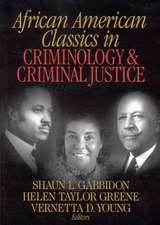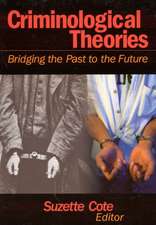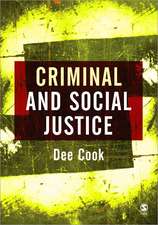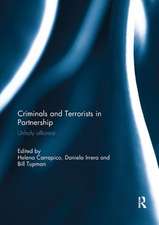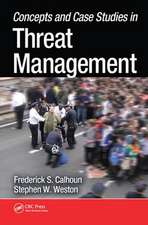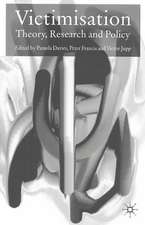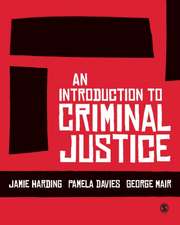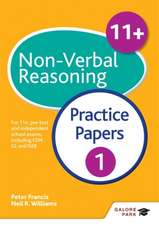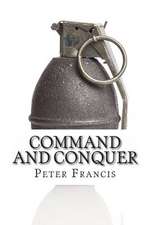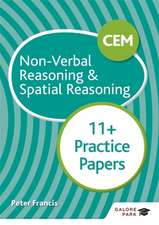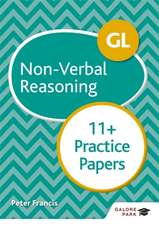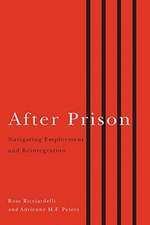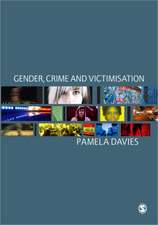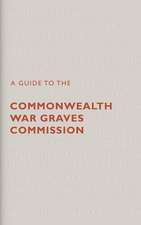Doing Criminological Research
Autor Pamela Davies, Peter Francisen Limba Engleză Paperback – 12 oct 2018
As a trusted companion, this book brings together a range of experts in the field to provide key perspectives on how to prepare, do and present research. Each chapter comes with a range of learning features and contextualised case studies, giving an in-depth review on conducting research projects. The book:
- Includes fascinating case studies on transnational crime and policing, victims, male offenders, institutional abuse and more
- Comes with study questions, activities, key terms and a glossary
- Includes visual material which highlights and illustrates key points
- Contains new chapters on mixed methods; web based criminological research; experimental criminological research and quantitative criminological research
Preț: 348.90 lei
Nou
Puncte Express: 523
Preț estimativ în valută:
66.77€ • 69.53$ • 56.43£
66.77€ • 69.53$ • 56.43£
Carte disponibilă
Livrare economică 17 februarie-03 martie
Livrare express 31 ianuarie-06 februarie pentru 59.09 lei
Preluare comenzi: 021 569.72.76
Specificații
ISBN-13: 9781473902732
ISBN-10: 1473902738
Pagini: 576
Dimensiuni: 186 x 232 x 34 mm
Greutate: 1 kg
Ediția:Third Edition
Editura: SAGE Publications
Colecția Sage Publications Ltd
Locul publicării:London, United Kingdom
ISBN-10: 1473902738
Pagini: 576
Dimensiuni: 186 x 232 x 34 mm
Greutate: 1 kg
Ediția:Third Edition
Editura: SAGE Publications
Colecția Sage Publications Ltd
Locul publicării:London, United Kingdom
Recenzii
As criminological inquiry continues to broaden, deepen and diversify its presence within and across the social sciences, this third and substantially up-dated edition of ‘Doing Criminological Research’ is an indispensable source. Its range and scope, together with the authority of its coverage and analysis, render it a tour de force. Essential reading for entry level, and more experienced researchers, alike.
The third edition of Francis and Davies’ Doing Criminological Research will be a standard resource for British criminologists for years to come and an indispensable teaching tool. Its scope is comprehensive, its coverage is up-to-date, and its writers are first-rate. The editors have served the discipline well.
Peter Francis and Pamela Davies have done a great service to the criminological field by publishing this comprehensive and updated research textbook, bridging qualitative and quantitative methods, literature review and methodological innovation, politics and ethics, writing and autobiography, longitudinal and life-course research, big-data and ethnographical studies, visual and international research, case and evaluation studies.
The third edition of Doing Criminological Research provides a collection of high quality, reflective and accessible accounts of doing criminological research. This is a "must read" for anyone embarking on a research project. Contributors provide clear guidance on how to turn research ideas into research projects and insights into doing criminological research in new, innovative, dynamic and novel ways. Engendering a sense of excitement for students and scholars, this collection does much to stir the criminological imagination.
The third edition of Francis and Davies’ Doing Criminological Research will be a standard resource for British criminologists for years to come and an indispensable teaching tool. Its scope is comprehensive, its coverage is up-to-date, and its writers are first-rate. The editors have served the discipline well.
Peter Francis and Pamela Davies have done a great service to the criminological field by publishing this comprehensive and updated research textbook, bridging qualitative and quantitative methods, literature review and methodological innovation, politics and ethics, writing and autobiography, longitudinal and life-course research, big-data and ethnographical studies, visual and international research, case and evaluation studies.
The third edition of Doing Criminological Research provides a collection of high quality, reflective and accessible accounts of doing criminological research. This is a "must read" for anyone embarking on a research project. Contributors provide clear guidance on how to turn research ideas into research projects and insights into doing criminological research in new, innovative, dynamic and novel ways. Engendering a sense of excitement for students and scholars, this collection does much to stir the criminological imagination.
Cuprins
Decision Making and Reflexivity in Doing Criminological Research - Pamela Davies and Peter Francis
Planning and Proposing Criminological Research - Peter Francis
Undertaking a Criminological Literature Review - Alison Wakefield
Methodological Approaches to Criminological Research - Hannah Bows
Using Mixed Methods in Criminological Research - Vicky Heap and Jaime Waters
The Politics and Ethics of Criminological Research - David Scott
Writing Up and Presenting Criminological Research - Alexandra Hall
Using Historical Artefacts, Records and Resources in Criminological Research - Pam Cox, Heather Shore and Barry Godfrey
Using Social Surveys in Criminological Research - Jo Deakin and Jon Spencer
Doing Quantitative Data Analysis in Criminological Research - Nick Tilley, Graham Farrell and Andromachi Tseloni
Using Big Data and Data Analytics in Criminological Research - Lyria Bennett Moses and Janet Chan
Doing Qualitative Data Analysis in Criminological Research - Pamela Davies
Doing Longitudinal and Life-Course Criminological Research - Jerzy Sarnecki and Christoffer Carlsson
Using Interviews as Storytelling in Criminological Research - Elizabeth Stanley
Using In-Depth Interviewing and Documentary - Marie Segrave and Sanja Milivojevic
Using Biography and Autobiography in Criminological (and Victimological) Research - Ross McGarry and Zoe Alker
Doing Ethnographic Research in Criminology - Steve Hall
Doing Criminological Research Online - Majid Yar
Using Visual Methods in Criminological Research - Ronnie Lippens
Doing Comparative Criminological Research - Matthew Hall
Using Case Study Methods in Criminological Research - Kathleen Daly
Doing Criminological Evaluation Research - Rob White
Glossary
Planning and Proposing Criminological Research - Peter Francis
Undertaking a Criminological Literature Review - Alison Wakefield
Methodological Approaches to Criminological Research - Hannah Bows
Using Mixed Methods in Criminological Research - Vicky Heap and Jaime Waters
The Politics and Ethics of Criminological Research - David Scott
Writing Up and Presenting Criminological Research - Alexandra Hall
Using Historical Artefacts, Records and Resources in Criminological Research - Pam Cox, Heather Shore and Barry Godfrey
Using Social Surveys in Criminological Research - Jo Deakin and Jon Spencer
Doing Quantitative Data Analysis in Criminological Research - Nick Tilley, Graham Farrell and Andromachi Tseloni
Using Big Data and Data Analytics in Criminological Research - Lyria Bennett Moses and Janet Chan
Doing Qualitative Data Analysis in Criminological Research - Pamela Davies
Doing Longitudinal and Life-Course Criminological Research - Jerzy Sarnecki and Christoffer Carlsson
Using Interviews as Storytelling in Criminological Research - Elizabeth Stanley
Using In-Depth Interviewing and Documentary - Marie Segrave and Sanja Milivojevic
Using Biography and Autobiography in Criminological (and Victimological) Research - Ross McGarry and Zoe Alker
Doing Ethnographic Research in Criminology - Steve Hall
Doing Criminological Research Online - Majid Yar
Using Visual Methods in Criminological Research - Ronnie Lippens
Doing Comparative Criminological Research - Matthew Hall
Using Case Study Methods in Criminological Research - Kathleen Daly
Doing Criminological Evaluation Research - Rob White
Glossary
Notă biografică
Professor Pamela Davies¿ research interests coalesce around gender, crime, harm, victimization and justice. Combining her interest in victimology and social harm with a critical/feminist infused approach she has explored a range of contemporary social problems ¿ both visible and hidden. Her early research explored female offending and the inter-play between women¿s offending patterns and experiences of victimization. More recently she has examined tensions around social and environmental justice adopting a case study approach. She has lead a number of research projects and evaluations of multi-agency innovations that tackle gendered forms of harm including interpersonal violence, domestic abuse, the policing of serial perpetrators and support for victims. The ways in which gender mediates our life experiences continues to provoke new areas of inquiry and she is currently working with colleagues on `gendering green criminology¿.
Pam has published widely on the subject of victimization and social harm and on how gender connects to matters of community safety, public protection and well-being. Her most recent books are Crime and Power authored with Tanya Wyatt and Victimology Research Policy and Activism edited with Jacki Tapley. She is the series editor of the Palgrave Macmillan `Victims and Victimology¿ book series (with Associate Professor Tyrone Kirchengast, University of New South Wales, Sydney).
Pam has published widely on the subject of victimization and social harm and on how gender connects to matters of community safety, public protection and well-being. Her most recent books are Crime and Power authored with Tanya Wyatt and Victimology Research Policy and Activism edited with Jacki Tapley. She is the series editor of the Palgrave Macmillan `Victims and Victimology¿ book series (with Associate Professor Tyrone Kirchengast, University of New South Wales, Sydney).
Descriere
A trusted, full-featured companion to criminological research, this edition expands and updates case studies, methods and project strategies to help students prepare, do and present their research.




